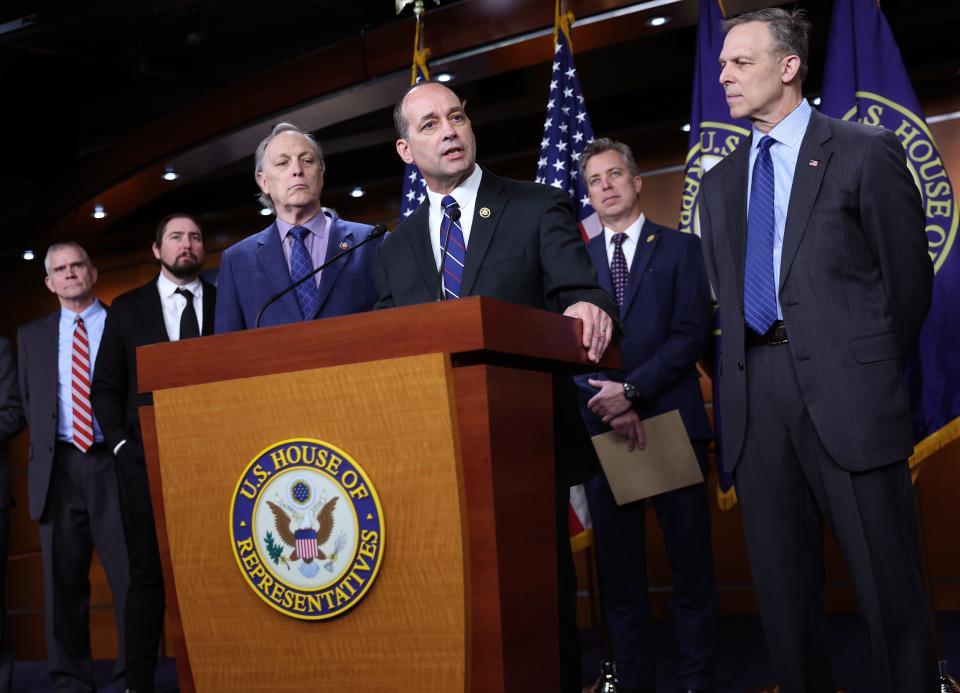Spending bill vote shows limits of political brinksmanship for House Freedom Caucus members
- Oops!Something went wrong.Please try again later.
WASHINGTON – When Republicans took control of the House last year with almost the thinnest of majorities, all eyes turned to the House Freedom Caucus. The loose group of 30-some ultraconservative lawmakers outnumbered the narrow vote margin for Republicans and, as a result, were granted new outsized leverage over leadership to cater to their whims.
From the start, it appeared the Freedom Caucus and its like-minded colleagues were going to call the shots, and at times, they did. But after the House passed a massive $1.2 trillion spending package on Friday, those rebels were dealt a decisive defeat with no clear strategy to pressure leadership to cave to their demands.
Even a surprise proposal from Rep. Marjorie Taylor Greene, R-Ga., to oust Johnson introduced Friday was met with refusal from some of her peers, indicating there’s not much appetite for further chaos from the right flank of the conference.
And while ultraconservatives are watching their power slip, House Speaker Mike Johnson, R-La., has become more decisive and willing to ignore the noise from his right flank. After crowing for months at Johnson to play hardball with Democrats and even leverage a government shutdown to extract hard-right conservative policy victories, their calls ultimately fell on deaf ears when the House green-lighted the package to fund the government long-term and avert a partial shutdown.
“This is a bad bill. We shouldn’t put it on the floor and leadership owns it,” Rep. Chip Roy, R-Texas, a member of the House Freedom Caucus said Thursday on the House steps. “This bill in real time is a failure. So we’re gonna have to figure out what to do about it.”

But Roy, along with his other Freedom Caucus colleagues, couldn’t do much about it and probably won’t be able to stop similar bipartisan bills in the future. The leader of the raucous caucus even says so himself.
“Anything that we thought we could do, we’ve done. So, open to your ideas,” Rep. Bob Good, R-Va., chair of the caucus, told USA TODAY. “Obviously, we’re not sitting here thinking, ‘Here’s all the things we should’ve done that we didn’t do.’ If we knew those things, we would have done them.”
One of the few things conservatives could do was tank procedural rule votes on the House floor and freeze the lower chamber as a way to express their anger at leadership, but that can only been effective for so long.
In response, Johnson has been forced to opt for a procedural tactic called suspension to muscle legislation to the floor with little debate. Any legislation advanced this way requires a two-thirds majority to pass, sidestepping conservatives.
One House Republican who spoke to USA TODAY on the condition of anonymity to speak candidly said the Freedom Caucus should have seen their waning influence coming after their antics.
“Some of these guys are super savvy operators who understand leverage,” the GOP lawmaker said. “Others of them are more interested in being chaos agents. In which case, rational thought isn’t really their thing.”
Other Republicans say the Freedom Caucus’s failures are a product of its own making after shooting down rule votes. Johnson himself has said he lost significant negotiating power with Democrats because of the dysfunction that has roiled the House.

“It’s really hard for me to listen to people that are complaining that the train’s not on time when (they) were the people ... blowing up the tracks all the way,” Rep. Ryan Zinke, R-Mont., told USA TODAY. “Now we’re at the station here, so don’t complain the train’s not on time.”
“They gotta play chess,” Rep. Don Bacon, R-Neb., said, calling the situation “ironic” since the hard-right’s refusal to compromise has created more bipartisanship because bills under suspension require heavy support.
In the early months of Johnson’s speakership, the previously little-known Republican was the source of frustration for some members who described him as dithering. That was in part due to ultraconservative pressure.
Little illustrates that dynamic better than a meeting between the speaker and his right flank in January. Days after Johnson announced an initial handshake agreement with Senate Democrats on spending levels, conservatives met with Johnson and his deputies in the speaker’s suite for almost two hours, urging him to renege on the deal – even though it had just been struck.
Conservatives left that meeting optimistic about their chances and told reporters the speaker was considering alternative paths. The following day, much to their chagrin, Johnson announced the deal would remain in place, defying the intense lobbying campaign against him. For the remainder of the government funding battle, Johnson rarely bowed to conservative pressure.
“He’s adapting,” Rep. Patrick McHenry, R-N.C., who has openly criticized Johnson’s leadership and served as interim speaker while Republicans bickered over who should lead them, told USA TODAY. McHenry said Johnson is still taking “everybody’s opinion into account” but that “it’s a good thing” the speaker has become more decisive.
“He seems to be getting a lot more comfortable in the role and operating. It’s something a lot of us like to see and I hope he continues to do it and we can be way more effective,” Rep. Max Miller, R-Ohio, who has also panned Johnson in the past, said.

Still, conservatives have been successful on occasion. Aggravated over former House Speaker Kevin McCarthy, R-Calif., leading a bipartisan deal to temporarily avert a shutdown last year, Rep. Matt Gaetz, R-Fla., along with seven other conservative rebels and all House Democrats, ousted McCarthy from the speakership. It resulted in a chaotic speaker election that saw Johnson ascend to the top job.
Greene threatened to kick off that process again on Friday morning, filing a motion to vacate against Johnson over negotiating with Democrats on the final spending package. But in an election year with little change after ousting McCarthy, there’s little appetite to supplant Johnson.
Rep. Tim Burchett, R-Tenn., one of the eight Republicans who voted to remove McCarthy, said he is “currently no” on vacating McCarthy and expressed concerns that ousting Johnson could see House Minority Leader Hakeem Jeffries, D-N.Y., elected as speaker.
Gaetz, the ringleader of the ousting of McCarthy, said Thursday he wouldn’t support a motion to vacate and said, “If we vacated this speaker, we’d end up with a Democrat,” also suggesting some Republicans would vote for Jeffries for speaker.
Greene has also not noticed her resolution as privileged, meaning the House is not forced to vote on vacating Johnson unless she changes her mind. Several House Republicans are skeptical Greene’s efforts to oust Johnson would be successful, and House Democrats have said they would consider saving the speaker.
“I filed the motion to vacate today, but it’s more of a warning and pink slip,” Greene said on the House steps on Friday. “I do not wish to inflict pain in our conference and to throw the House into chaos.”
Another House Republican told USA TODAY on the condition of anonymity that the hard-right vastly overestimated the leverage they had with the speaker and congressional Democrats. On the other hand, “they underestimated the hatred they have earned,” for their unruliness, the GOP lawmaker said.
Across the aisle, Democrats are welcoming the Freedom Caucus’ shrinking power.
“I think they’re getting finally less and less relevant,” Rep. Annie Kuster, D-N.H., chair of the New Democrat Coalition, a group of almost 100 centrist Democrats, told USA TODAY. The group “can pound sand as far as I’m concerned,” she said.
Kuster said she had a personal conversation with Johnson on the House floor on Thursday, during which the speaker committed to bring Ukraine aid in some form up for a vote – the next pressing issue for Congress when it returns from its two-week recess. Johnson, she thought, is “starting to live up to that role as a leader.”
That begs the question: Is he an improvement over McCarthy, who Democrats treated with scorn and unanimously voted to remove with conservative rebels last year?
“Let’s give it another couple of weeks!” Kuster said, breaking out into laughter. “He’s headed in that direction!”

This article originally appeared on USA TODAY: With spending bill passed, House Freedom Caucus dealt decisive blow

